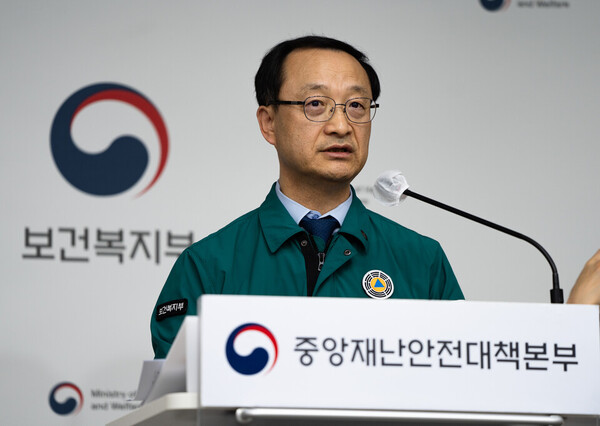Interns and residents who resigned en masse to oppose the increase of medical school enrollment quota will likely face de facto license revocation if they fail to return to their hospitals and complete their training.
The government, which does not allow resigned medical residents to work at other hospitals or open their clinics, said such a rule will remain effective even after the three-month license suspension ends.
The government reaffirmed its principle at a regular briefing of the Central Disaster and Safety Countermeasures Headquarters on Friday.

"The government has yet to take a specific administrative action (against the collective resignation of trainee doctors), as it has issued a practice maintenance order for all medical residents," said Deputy Health Minister Jun Byung-wang. "Therefore, (the interns and residents on leave with absence) must return to work as soon as possible and continue training at their hospitals while maintaining their status as trainee doctors."
Jeon added that even if an administrative penalty is imposed, they will still have the status of a medical resident once the administrative penalty period has passed, so they should return to their training hospitals and continue training.
"Since all doctors are currently subject to the treatment maintenance order, medical institution officials should be careful not to process the resignation of interns and residents at their initiative without reviewing the existing administrative orders with validity," he added.
Based on the government's interpretation, if the training hospital does not process the resignations, the resigning trainee doctors will continue to be residents of the training hospital. They will not be able to work or open a clinic elsewhere.
The government's position is that if a trainee doctor opens a medical institution or works at another hospital, the head of the training hospital may discipline him or her according to the training rules, and if he or she writes a prescription or medical record under someone else's name, not only the Medical Service Act punishes the trainee doctor, but also a practicing physician who employs the trainee doctor could be punished by the criminal code.
In other words, if the medical residents do not return voluntarily, the penalty on them is effectively the same as license revocation.
Meanwhile, the government has identified cases where 10 or fewer medical residents have been reported as duplicate staff at other medical institutions.
"The government will check the facts and have training hospitals discipline them. If they violated the Medical Service Act, we will take action, too," Jeon said.
Related articles
- [Contribution] Truth about medical professors’ resignations
- Experts clash over effective dates of trainee doctors' resignation letters
- Korean trainee doctors seek ILO's intervention against government's work order mandate
- 'Void of trainee doctors, Big 5 hospitals could suffer bankruptcies in a cascade'
- Exodus of medical residents forces neurological society to cancel workshop
- Medical professors at University of Ulsan unanimously decide to resign
- Nurses are filling in trainee doctors from today. Here’s what they can and can’t do.
- International women physicians condemn gender-biased remarks by Korean official
- Med school professors call for concessions but Seoul stands firm on increasing med school quota
- 350 delayed surgeries reported in 1 month after trainee doctors left hospitals
- Health Ministry issues public notice mandating return-to-work for 1,308 trainee doctors
- Professors from top Korean medical schools to resign en mass next Monday
- A departing cardiothoracic surgeon laments healthcare crisis in Korea
- Korea to block resigned trainee doctors from getting US medical license

